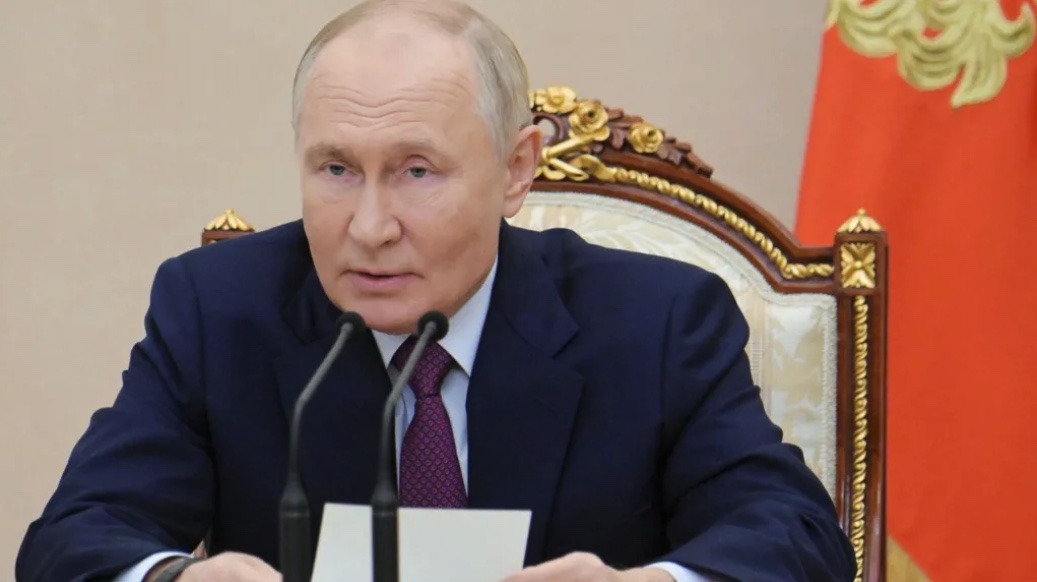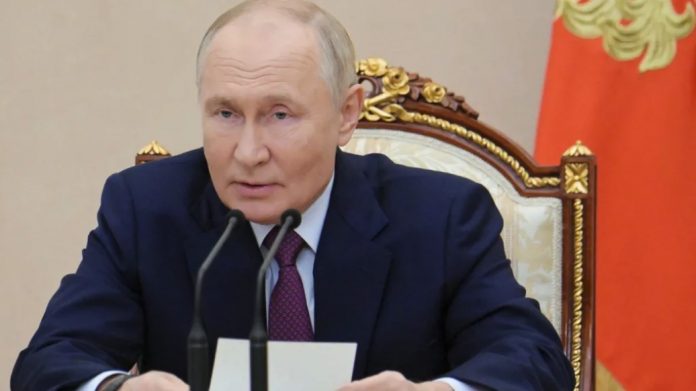วลาดิเมียร์ ปูติน กล่าวว่ารัสเซียจะพิจารณาการโจมตีจากรัฐที่ไม่มีอาวุธนิวเคลียร์ แต่ได้รับการสนับสนุนจากรัฐที่มีอาวุธนิวเคลียร์ว่าเป็น “การโจมตีร่วมกัน” ซึ่งอาจถูกตีความว่าเป็นการขู่ใช้อาวุธนิวเคลียร์ในสงครามกับยูเครน
ในคำกล่าวสำคัญเมื่อคืนวันพุธ ประธานาธิบดีรัสเซียกล่าวว่ารัฐบาลของเขากำลังพิจารณาเปลี่ยนแปลงกฎและเงื่อนไขที่รัสเซียจะใช้อาวุธนิวเคลียร์ ยูเครนเป็นรัฐที่ไม่มีอาวุธนิวเคลียร์ แต่ได้รับการสนับสนุนทางทหารจากสหรัฐฯ และประเทศอื่น ๆ ที่มีอาวุธนิวเคลียร์
ความคิดเห็นของเขามีขึ้นขณะที่ยูเครนกำลังพยายามขออนุมัติการใช้อาวุธมิสไซล์พิสัยไกลจากชาติตะวันตกโจมตีฐานทัพในรัสเซีย ประธานาธิบดียูเครน โวโลดิมีร์ เซเลนสกี ได้เดินทางไปยังสหรัฐฯ ในสัปดาห์นี้ และมีกำหนดพบกับประธานาธิบดีสหรัฐฯ โจ ไบเดน ในวันพฤหัสบดี ซึ่งคำขอของยูเครนคาดว่าจะเป็นหัวข้อหลักในการสนทนา
ปีนี้ยูเครนได้รุกล้ำเข้าไปในดินแดนของรัสเซีย และต้องการโจมตีฐานทัพในรัสเซียซึ่งยูเครนระบุว่ากำลังยิงมิสไซล์เข้ามาในยูเครน เพื่อตอบโต้ความคิดเห็นของปูติน หัวหน้าคณะทำงานของเซเลนสกี อันดรี เยียร์มัค กล่าวว่า “รัสเซียไม่มีอะไรเหลือแล้วนอกจากการขู่ใช้อาวุธนิวเคลียร์เพื่อข่มขู่โลก”
ปูตินเคยขู่ใช้อาวุธนิวเคลียร์มาก่อนแล้ว ซึ่งยูเครนได้วิพากษ์วิจารณ์ว่าเป็นการ “ข่มขู่ด้วยนิวเคลียร์” เพื่อยับยั้งพันธมิตรของตนจากการให้การสนับสนุนเพิ่มเติม พันธมิตรของรัสเซียอย่างจีนก็เรียกร้องให้เกิดความสงบ โดยมีรายงานว่าประธานาธิบดีสี จิ้นผิง ของจีน ได้เตือนปูตินไม่ให้ใช้อาวุธนิวเคลียร์
แต่เมื่อวันพุธ หลังจากการประชุมกับคณะมนตรีความมั่นคง ปูตินได้ประกาศการขยายการใช้อาวุธนิวเคลียร์ในเชิงรุก เขาเตือนว่าหลักคำสอนนิวเคลียร์ใหม่จะ “ระบุชัดเจนถึงเงื่อนไขที่รัสเซียจะเปลี่ยนไปใช้อาวุธนิวเคลียร์” และกล่าวว่าสถานการณ์เหล่านั้นรวมถึงการโจมตีด้วยขีปนาวุธทั่วไปต่อมอสโก
เขากล่าวว่ารัสเซียจะพิจารณา “ความเป็นไปได้” ในการใช้อาวุธนิวเคลียร์หากตรวจพบการเริ่มต้นการปล่อยขีปนาวุธ เครื่องบิน หรือโดรนจำนวนมากเข้าสู่ดินแดนของรัสเซีย ซึ่งก่อให้เกิด “ภัยคุกคามร้ายแรง” ต่ออธิปไตยของประเทศ เขาเสริมว่า “มีข้อเสนอให้พิจารณาการรุกรานรัสเซียโดยรัฐที่ไม่มีอาวุธนิวเคลียร์ แต่ได้รับการสนับสนุนหรือร่วมมือกับรัฐที่มีอาวุธนิวเคลียร์ เป็นการโจมตีร่วมกันต่อสหพันธรัฐรัสเซีย”
ปูตินกล่าวว่าคลังอาวุธนิวเคลียร์ของประเทศเป็น “การรับประกันความปลอดภัยที่สำคัญที่สุดของรัฐและพลเมืองของเรา” นับตั้งแต่สิ้นสุดสงครามโลกครั้งที่สอง รัฐที่มีอาวุธนิวเคลียร์ได้ยึดมั่นในนโยบายยับยั้ง โดยยึดหลักว่าหากประเทศที่ทำสงครามยิงอาวุธนิวเคลียร์ครั้งใหญ่ มันจะนำไปสู่การทำลายล้างกันเองโดยสิ้นเชิง
แต่อาวุธนิวเคลียร์เชิงยุทธวิธีมีหัวรบขนาดเล็กกว่า ซึ่งออกแบบมาเพื่อทำลายเป้าหมายโดยไม่มีผลกระทบกัมมันตรังสีอย่างกว้างขวาง ในเดือนมิถุนายน ปูตินได้เตือนประเทศในยุโรปที่สนับสนุนยูเครน โดยกล่าวว่ารัสเซียมี ” [อาวุธนิวเคลียร์เชิงยุทธวิธี] มากกว่าที่มีอยู่ในทวีปยุโรป แม้ว่าสหรัฐฯ จะนำอาวุธของพวกเขามาด้วยก็ตาม”
“ยุโรปไม่มีระบบเตือนภัยล่วงหน้าที่พัฒนาแล้ว” เขาเสริมว่า “ในแง่นี้พวกเขาแทบจะไม่มีการป้องกัน” ขณะนั้นเขาได้บอกเป็นนัยถึงการเปลี่ยนแปลงในหลักคำสอนนิวเคลียร์ของรัสเซีย ซึ่งเป็นเอกสารที่ระบุเงื่อนไขที่มอสโกจะใช้อาวุธนิวเคลียร์
Putin proposes new rules for using nuclear weapons

Vladimir Putin says Russia would consider an attack from a non-nuclear state that was backed by a nuclear-armed one to be a “joint attack”, in what could be construed as a threat to use nuclear weapons in the war in Ukraine.
In key remarks on Wednesday night, the Russian president said his government was considering changing the rules and preconditions around which Russia would use its nuclear arsenal.
Ukraine is a non-nuclear state that receives military support from the US and other nuclear-armed countries.
His comments come as Kyiv seeks approval to use long-range Western missiles against military sites in Russia.
Ukraine’s President Volodymyr Zelensky has travelled to the US this week and is due to meet US President Joe Biden in Washington on Thursday, where Kyiv’s request is expected to be top of the agenda.
Ukraine has pushed into Russian territory this year and wants to target bases inside Russia which it says are sending missiles into Ukraine.
Responding to Putin’s remarks, Zelensky’s chief of staff Andriy Yermak said Russia “no longer has anything other than nuclear blackmail to intimidate the world”.
Putin has threatened the use of nuclear weapons before. Ukraine has criticised it as “nuclear sabre-rattling” to deter its allies from providing further support.
Russian ally China has also called for calm, with reports President Xi Jinping has warned Putin against using nuclear arms.
But on Wednesday, after a meeting with his Security Council, Putin announced the proposed radical expansion.
A new nuclear doctrine would “clearly set the conditions for Russia to transition to using nuclear weapons,” he warned – and said such scenarios included conventional missile strikes against Moscow.
He said that Russia would consider such a “possibility” of using nuclear weapons if it detected the start of a massive launch of missiles, aircraft and drones into its territory, which presented a “critical threat” to the country’s sovereignty.
He added: “It is proposed that aggression against Russia by any non-nuclear state, but with the participation or support of a nuclear state, be considered as their joint attack on the Russian Federation.”
The country’s nuclear arms were “the most important guarantee of security of our state and its citizens”, the Kremlin leader said.
Since the end of World War Two, nuclear-armed states have engaged in a policy of deterrence, which is based on the idea that if warring states were to launch major nuclear strikes it would lead to mutually assured destruction.
But there are also tactical nuclear weapons which are smaller warheads designed to destroy targets without widespread radioactive fallout.
In June, Putin delivered a warning to European countries supporting Ukraine, saying Russia had “many more [tactical nuclear weapons] than there are on the European continent, even if the United States brings theirs over.”
“Europe does not have a developed [early warning system],” he added. “In this sense they are more or less defenceless.”
At the time he had hinted of changes to Russia’s nuclear doctrine – the document which sets out the conditions under which Moscow would use nuclear weapons.
By Frances Mao, BBC News

















